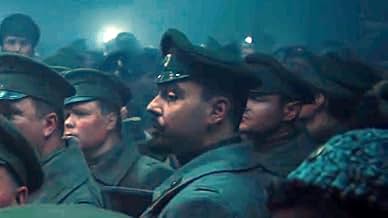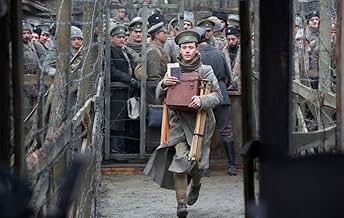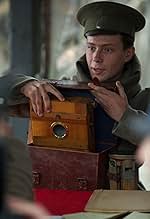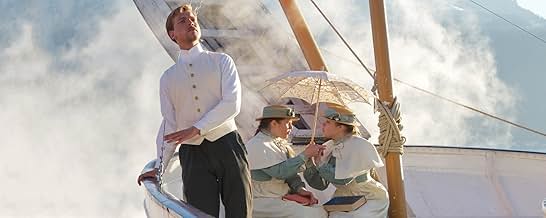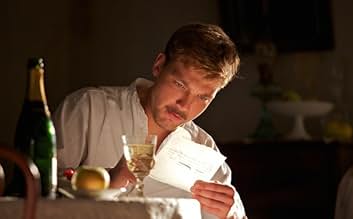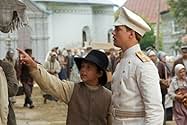Solnechnyy udar
- 2014
- 2h 55min
NOTE IMDb
5,8/10
1,2 k
MA NOTE
Ajouter une intrigue dans votre langueOfficers of the White Army, holding as POWs in a Red Army's camp, try to understand why they lose Civil War and lost the Russian Empire at all.Officers of the White Army, holding as POWs in a Red Army's camp, try to understand why they lose Civil War and lost the Russian Empire at all.Officers of the White Army, holding as POWs in a Red Army's camp, try to understand why they lose Civil War and lost the Russian Empire at all.
- Réalisation
- Scénario
- Casting principal
- Récompenses
- 6 victoires et 3 nominations au total
Martins Kalita
- Poruchik
- (as Martinsh Kalita)
Avis à la une
This movie is actually two different stories. One is Bunin's short story Sunstroke which is shown in a beautiful and poetic way in the movie. It represents the past, old Russia, the time Bunin never dropped in his mind. The other is taken from his famous anti Bolshevism book Cursed Days. This part is shown in the movie, in a wet and muddy way, about a group of old officers waiting for their destiny after signed their declarations of surrender.
It is understandable that the director tried to divide these two stories. Old is good, elegant, beautiful, lovely, honestly. New is chaotic, dirty, brutal, empty. Although one may not fully agree with it, but this is what Ivan Bunin's understanding of Bolshevism Revolution and the opinion is widely accepted after the collapse of Soviet Russia. Nikita Mikhalkov's most famous movies are almost about the same attitude.
But the director also used his movie to pay tribute to old Soviet movie traditions. There's an astonishing shot of a baby carriage rolling downsteps, which is obviously something reminding Eisenstein. There's also certain images reminding Bondalchuk.
So far there's no problem with the two stories go in parallel. But at the very end the stories tried to reach a point of combination. This became so hard to believe that the climax felt a little bit strange.
Still it's a great movie. Despite its length, the storytelling speed is extremely well that one hardly felt the time's gone. It might also be one element the director had in mind. Time went without raising attention, old time went like river never comes back.
It is understandable that the director tried to divide these two stories. Old is good, elegant, beautiful, lovely, honestly. New is chaotic, dirty, brutal, empty. Although one may not fully agree with it, but this is what Ivan Bunin's understanding of Bolshevism Revolution and the opinion is widely accepted after the collapse of Soviet Russia. Nikita Mikhalkov's most famous movies are almost about the same attitude.
But the director also used his movie to pay tribute to old Soviet movie traditions. There's an astonishing shot of a baby carriage rolling downsteps, which is obviously something reminding Eisenstein. There's also certain images reminding Bondalchuk.
So far there's no problem with the two stories go in parallel. But at the very end the stories tried to reach a point of combination. This became so hard to believe that the climax felt a little bit strange.
Still it's a great movie. Despite its length, the storytelling speed is extremely well that one hardly felt the time's gone. It might also be one element the director had in mind. Time went without raising attention, old time went like river never comes back.
While the movie was indeed visually beautiful, almost stunning even, I was left disappointed and annoyed, feeling like I watched 2 movies squeezed into one. I won't give away any plot points: Through the movie we watch the main character's past and present events unfold. However, the past could've been a standalone film, the present as well. The two segments weren't connected by a single detail almost to the very end of the movie, and even then that detail is so minuscule and irrelevant we could've easily gone without it.
When it comes out on DVD, I'd watch it again, selectively watching just scenes from the past, then just scenes from the future, treating myself to 2 movies, instead of a forced ONE movie.
When it comes out on DVD, I'd watch it again, selectively watching just scenes from the past, then just scenes from the future, treating myself to 2 movies, instead of a forced ONE movie.
I won't give away the "key" -- that's for the viewer to discover -- but until I figured it out for myself, about 2/3 of the way through, I was so exasperated by this movie that I was tempted to just give up on it and quit. I thought it was incoherent and disjointed, and actually got peeved since I thought it was screwing with me.
But THEN... I figured out who/what the young officer in white, and the various appearances of the attractive woman, represented... and my whole experience changed. By the end of the movie, I was devastated. The lingering final image and text -- and the song sung over it -- left me trembling and weeping. The whole thing haunted me for days, then weeks, afterward.
I intend to watch it again from the beginning, now that I know what it's about. But I am waiting a bit, since I still haven't recovered from that first experience.
This is a very different kind of movie. It's NOT a straight story/narrative, and expecting such will just leave you frustrated. Mikhalkov is a sort of poet, who has used seemingly unconnected images to evoke feelings and impressions. He uses visual/emotional images to conceal deep realities of history. And, for this viewer at least, realities of humanity in general. For though the movie is concerned with 20th-century Russia/USSR, it speaks to me, as an American in 2022, of a more general truth, one we should all take to heart as our own glittering Western consumer culture heads for collapse: Concealed beneath superficially beautiful things (and hoo-boy, are the "in-color" parts of this movie a sensual feast for the eyes!) can lie the ugliest horrors of which humans are capable.
But THEN... I figured out who/what the young officer in white, and the various appearances of the attractive woman, represented... and my whole experience changed. By the end of the movie, I was devastated. The lingering final image and text -- and the song sung over it -- left me trembling and weeping. The whole thing haunted me for days, then weeks, afterward.
I intend to watch it again from the beginning, now that I know what it's about. But I am waiting a bit, since I still haven't recovered from that first experience.
This is a very different kind of movie. It's NOT a straight story/narrative, and expecting such will just leave you frustrated. Mikhalkov is a sort of poet, who has used seemingly unconnected images to evoke feelings and impressions. He uses visual/emotional images to conceal deep realities of history. And, for this viewer at least, realities of humanity in general. For though the movie is concerned with 20th-century Russia/USSR, it speaks to me, as an American in 2022, of a more general truth, one we should all take to heart as our own glittering Western consumer culture heads for collapse: Concealed beneath superficially beautiful things (and hoo-boy, are the "in-color" parts of this movie a sensual feast for the eyes!) can lie the ugliest horrors of which humans are capable.
10papaioan
Sublime fusion of two of Bunin's works, with beautifully achieved juxtaposed cinematography. The viewer is put in the shoes of the protagonist's plight while bitterly recollecting the most hopeful moment in his past.
Excellent movie, excellent direction and acting, fantastic scenaries and photograph. Unfairly Underrated in IMDM probably by American pie watchers
Le saviez-vous
- AnecdotesThe film was selected as the Russian entry for the Best Foreign Language Film at the 88th Academy Awards but it was not nominated.
- ConnexionsFeatured in Vecherniy Urgant: Nikita Mikhalkov/Viktoriya Solovyova (2014)
- Bandes originalesNe dlya menya
Music by Nikolay Devitte
Lyrics by A. Molchanov
Performed by Nikita Mikhalkov and State Academic Kuban Cossack Choir
Meilleurs choix
Connectez-vous pour évaluer et suivre la liste de favoris afin de recevoir des recommandations personnalisées
- How long is Sunstroke?Alimenté par Alexa
Détails
Box-office
- Montant brut mondial
- 1 679 843 $US
- Durée2 heures 55 minutes
- Couleur
- Mixage
- Rapport de forme
- 2.35 : 1
Contribuer à cette page
Suggérer une modification ou ajouter du contenu manquant

Lacune principale
By what name was Solnechnyy udar (2014) officially released in India in English?
Répondre

